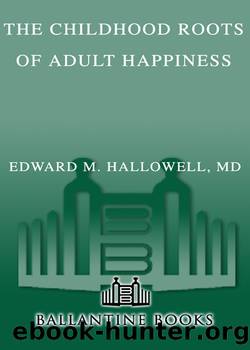The Childhood Roots of Adult Happiness by Edward M. Hallowell M.D

Author:Edward M. Hallowell, M.D.
Language: eng
Format: epub
ISBN: 9780345458667
Publisher: Random House Publishing Group
Published: 2002-10-01T00:00:00+00:00
At the end of selected chapters about the five steps, I offer some tips related to the particular step discussed in that chapter. I offer the tips on creating connectedness at the end of each section describing a specific kind of connectedness in the extended chapter on connectedness, Chapter 13.
Here, then, some tips on play:
⢠Understand what play means and how important it is for children (and adults). If you donât stop to think, you might make the common mistake of assuming that a child who is going through the motions at basketball practice is playing while a child who is sitting under a tree with a friend is not. The child at basketball practice may be just listlessly doing what he has been told to do, while the child beneath the tree with his friend may be dreaming up the most amazing spaceship ever invented.
⢠Make time for play. You may have to carve the time out of the hardwood of the daily schedule, but do it. Children (and adults) need free time to play. They need time when nothing is on the agenda. They need time when they are not expected to be anywhere, doing anything.
⢠Limit electronic time. You may set aside free time only to see your children fill it with Nintendo or chat rooms or instant messaging. My advice is to limit this time, not forbid it. In our house the rule is one hour per day of what we call âelectronic timeâ (television, video, computer, and Nintendo) during the week and two hours on weekends. With the rest of their free time, we ask our children to amuse themselves, find a friend, devise a game, read a book, or in some other way use their imaginations to entertain themselves. Little do they know that this time is perhaps the most important time of their entire day.
⢠Donât overschedule your children with enriching activities that obliterate their time for unstructured play. Make sure they have time for just hanging out. We can give our children too much of a good thing if we are not careful. Too many lessons (violin, soccer, computer skills, Hebrew, and so forth). Too many exciting, preprogrammed activities. The next thing you know, you create a kind of high-stimulation junkie, a child who cannot think up anything on his own.
⢠Sports are great arenas for play, but donât turn youth sports into a pressure-packed, hypercompetitive drama. Youth sportsâand all athletics in childhoodâought to be a place to have fun. It ought to be a place to plant the childhood roots of adult happiness, not adult rage or regret. It ought to be a place to learn about teamwork and team loyalty, cooperation, compromise, sacrifice, how to deal with people who are more talented than you and less talented than you, how to win and lose gracefully, and other life lessons. The win-loss record of the team is the least important item on the list.
⢠Relearn how to play as an adult. Go out in the yard or sit down on the floor, and let yourself go.
Download
This site does not store any files on its server. We only index and link to content provided by other sites. Please contact the content providers to delete copyright contents if any and email us, we'll remove relevant links or contents immediately.
Rewire Your Anxious Brain by Catherine M. Pittman(18640)
Talking to Strangers by Malcolm Gladwell(13344)
The Art of Thinking Clearly by Rolf Dobelli(10446)
Mindhunter: Inside the FBI's Elite Serial Crime Unit by John E. Douglas & Mark Olshaker(9313)
Becoming Supernatural by Dr. Joe Dispenza(8196)
Change Your Questions, Change Your Life by Marilee Adams(7754)
Nudge - Improving Decisions about Health, Wealth, and Happiness by Thaler Sunstein(7689)
The Road Less Traveled by M. Scott Peck(7592)
The Lost Art of Listening by Michael P. Nichols(7487)
Mastermind: How to Think Like Sherlock Holmes by Maria Konnikova(7315)
Enlightenment Now: The Case for Reason, Science, Humanism, and Progress by Steven Pinker(7305)
Win Bigly by Scott Adams(7183)
The Way of Zen by Alan W. Watts(6595)
Daring Greatly by Brene Brown(6501)
Big Magic: Creative Living Beyond Fear by Elizabeth Gilbert(5753)
Grit by Angela Duckworth(5601)
Ego Is the Enemy by Ryan Holiday(5412)
Men In Love by Nancy Friday(5232)
The Laws of Human Nature by Robert Greene(5170)
